Whether you have five employees or hundreds of workers on your payroll, security should be a top priority. It’s an essential part of keeping everyone in the building safe and creating a positive environment that fosters a sense of community and encourages customer loyalty.
Many business owners throughout the United States and Europe have begun to recognize the importance of having a quality small business security system. That’s led to explosive growth in the market, which means there are more options and configurations available now than at any other point in the past.
If you’ve been hesitant to install a security system for your small business—or expand the one you already have in place—there’s never been a better time to make the move. Before you do, make sure you fully understand all the security options available to small businesses like yours.
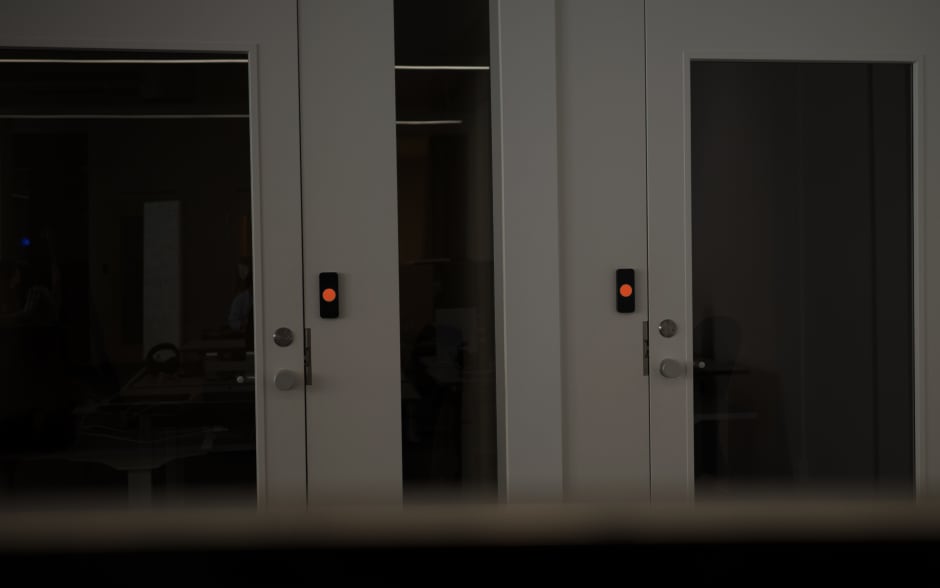
Even small businesses need security systems #
Any time you decide to make an improvement or change to your property, the first step is to decide whether it makes sense for your business. Adding a security system to your premises has a ripple effect throughout your organization, making your operations more efficient and increasing your revenue, on top of improving your physical and digital security.
Increasing employee safety #
For many small businesses, particularly those in areas with above-average crime rates, the ability to better protect employees is enough to justify installing a security system. Access control systems with alarms and intrusion alerts help prevent break-ins and physical attacks. If a crime does occur, a video surveillance system captures the event, allowing for thorough and effective investigations by law enforcement.
Many of the elements of a small business security system also enable you to shorten emergency response times. For example, a smoke alarm will immediately alert you if there’s a fire on your property so you can quickly reach out to the local fire department. In these types of situations, even a few minutes could mean the difference between lost life and a safe and healthy team.

Protecting assets, property, and data #
In addition to safeguarding your employees, a small business security system also helps you to defend your business property. The mere presence of security cameras in areas like parking lots and entryways can deter criminals from committing vandalism, theft, and property damage. This is especially important when so many small businesses are experiencing these types of crimes. According to a 2022 survey by the U.S. Chamber of Commerce, more than half of small businesses had reported theft over the past year.
This level of property protection also extends to your employees’ and guests’ belongings. For instance, if you install a video surveillance camera in a parking lot, it could help prevent someone from damaging or stealing a car belonging to a visitor in your building.
Physical objects aren’t the only kind of property you need to protect. Cyber-attacks result in lost, stolen, or compromised data, all of which could lead to reputational damage and financial penalties for your organization. A digital security system identifies and guards against these attacks, keeping your employee, client, and customer information secure.
Cutting costs with automation #
In the past, a small business that wanted to protect their property 24/7 usually had to hire a security guard or pay an employee to stay on site. Unfortunately, keeping someone on your property at all hours can get expensive. An automated physical security system eliminates the need for constant human surveillance.
For example, implementing an access control system integrated with cameras allows you to leave spaces unsupervised without worrying about security. With remote access, you’ll still have control over the space and the opportunity to monitor it no matter where you are or what time it is. In the long run, the cost of this type of automation is substantially lower than paying for full-time security coverage or having people on-site at all times to unlock doors for late-night vendors or unexpected deliveries.
Allowing remote monitoring and access control #

When you step out of the office for an hour or a weeks-long vacation, knowing that you can still maintain a connection to your property can ease your security and operations concerns. Modern security systems for small businesses often offer real-time monitoring, remote management, and alerts on mobile devices.
With these technologies, you can consistently check in on your business and will know right away if something happens on your premises. This is a crucial advantage for small business owners who want to maintain constant oversight of their properties, even when they can’t be physically present.
Addressing liability concerns and establishing trust #
As hard as you might try to prevent them, some accidents and incidents are unavoidable. When they occur, a security system is an asset. For example, if a visitor says that they were injured because of unsafe conditions on your property, a video recording serves as hard evidence that could potentially disprove their story.
A security system is also beneficial in that it demonstrates to customers, clients, and insurance companies that you’re committed to safe practices. From a customer’s perspective, this strengthens your reputation and shows that you value their safety and that of your employees. Many insurance companies also offer reduced rates for small businesses with security systems because it’s less likely that you’ll file a claim.
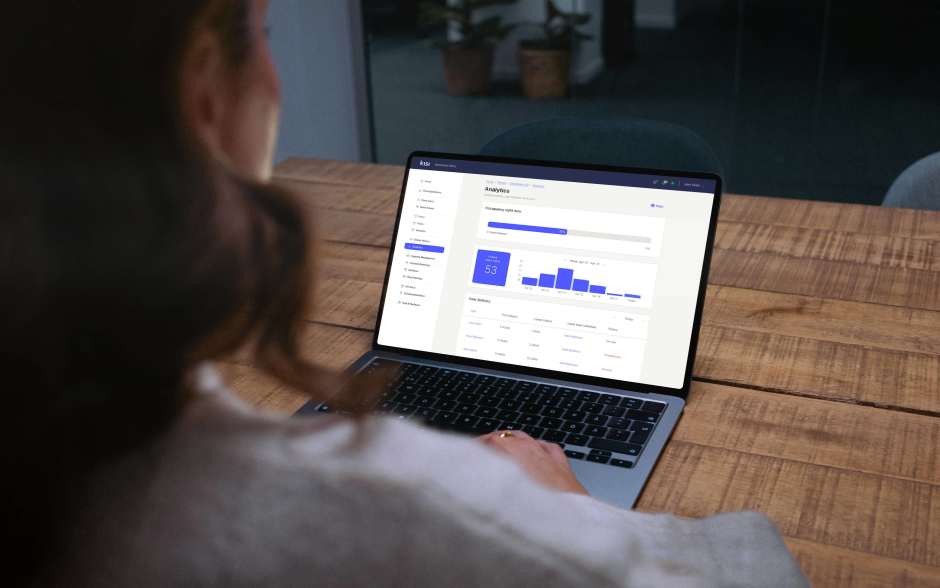
Saving time and streamlining operations #
One upside to a small business security system that many business owners aren’t aware of is how it can help you work more efficiently. An access control system, for instance, makes it possible for you to safely accept deliveries outside of regular business hours. This means you won’t be left waiting for an important shipment because the driver arrived after your team had already left for the day.
Another way that you can put a security system to work is by evaluating employee behaviors and performance. If your business is struggling in a particular area, having access to real-time monitoring and recording gives you the chance to find and correct any operational flaws or employee issues that are affecting your productivity.
Cloud-based access control systems also support and help small businesses create the office of the future and follow hybrid work policies. From flexible yet tailored unlock schedules to keeping track of office occupancy and employee attendance, hybrid work security systems enable the modern workforce.
Types of security systems for small businesses #
Many different kinds of systems fall under the umbrella of small business security. You can create a system that integrates the tools that are most important to your business, including:
- Video surveillance systems: Keeping an eye on your business at all hours is possible with video surveillance. These systems, which originated in the 1960s, allow you to monitor and record activity by placing cameras in and around your buildings.
- Access control systems: When it comes to keeping your property secure, access control systems are among the most critical tools at your disposal. They allow you to manage who enters and exits your premises at any given time.
- Alarm systems: Alarm systems are vital for protection from intruders and potentially life-threatening disasters. They notify you when there is a change in the conditions on your property, whether that’s the presence of smoke or a broken window.
- Cyber security systems: These systems defend against attacks on your computer hardware, software, data, and networks. They’ve become increasingly important as threats have increased, with 73% of small business owners in the United States experiencing a cyber-attack in 2022.
These systems are by no means mutually exclusive. Many small businesses use some version of all of them, creating a comprehensive security system that addresses all their challenges and vulnerabilities.
Essential components of small business security systems #
A small business security system consists of multiple parts that work together to protect your business. Depending on your needs and budget, you might opt to use many or just a few of these components, broken down by the specific type of system they support.
Access control components #
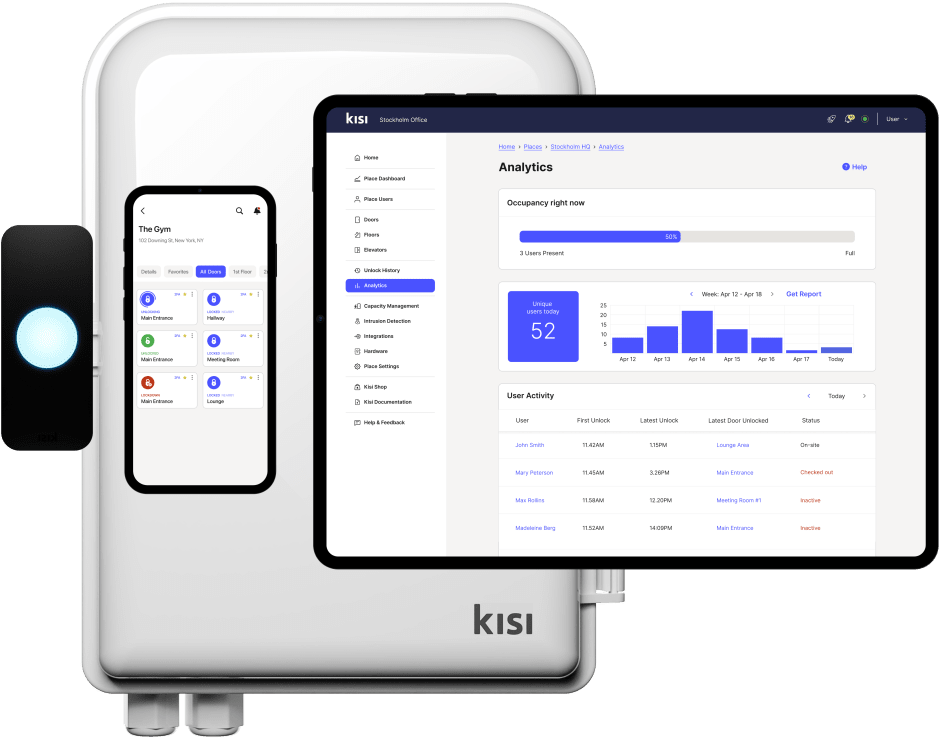
Access control systems include a few essential parts. Electronic locks are necessary for access control and are generally preferable to mechanical ones because they don’t require you to use a physical key, which can easily get lost, stolen, or broken.
By wiring an access controller, you can restrict access to your property to a specific group of people. Some systems, like Kisi, allow users to unlock doors through a mobile access app, so you don't have to issue physical credentials like fobs and keycards. Adding access readers is not necessary with this set up which makes it a budget-friendly solution for small businesses.
Including an access reader is vital for businesses that want to monetize their spaces, considering the extended convenience of the different access methods, like employee badges in Apple Wallet, contactless mobile unlocks, or QR codes. Cloud-based access systems, like Kisi, connect all hardware, allowing remote access management and ease of use from an intuitive dashboard.
Video surveillance components #
The most vital component of a video surveillance system is the video camera, but that’s not the only thing you’ll need. If you want to store footage, you’ll also need a recording device or access to a cloud service.
You can also use a video management system (VMS), which allows you to manage and control your cameras, review recordings, and use analytics. Your VMS, cameras, and other components work together to capture and store footage of events in and around your small business property.
Alarm system components #
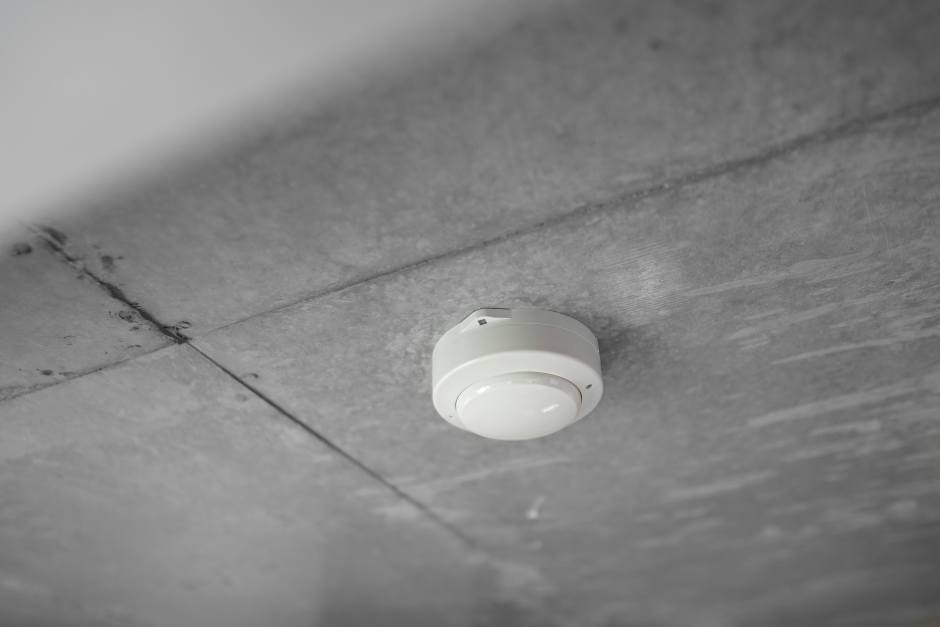
Alarm systems are a tried and true element of small business security. Burglar and fire alarms date back to the 1800s, but they’ve come a long way since then.
Today’s alarm systems rely on sensors that can identify a problem even when no one is present at your business. Some of the most common sensors include:
- Motion sensors for movement in spaces that should be empty
- Smoke and fire sensors for early fire detection and response
- Sound sensors for noises that could indicate an intruder
- Temperature sensors for extreme heat or cold that could damage your property
These sensors trigger alarms that notify you and, in some cases, emergency responders that a crisis is underway. These alarms might include on-property units that make people in the building aware of the danger, as well as mobile notifications that you receive while away from the property.
Other components to consider #
Some businesses take further security measures to protect their properties. These might include installing security lights that turn on when someone approaches the building or safety glass, which is significantly more difficult to break than normal window or door glass.
Another common addition to access control systems is a video intercom. An intercom grants you instant communication and visibility, so you can see and speak with people who approach your building.
How to choose a security system for small business #
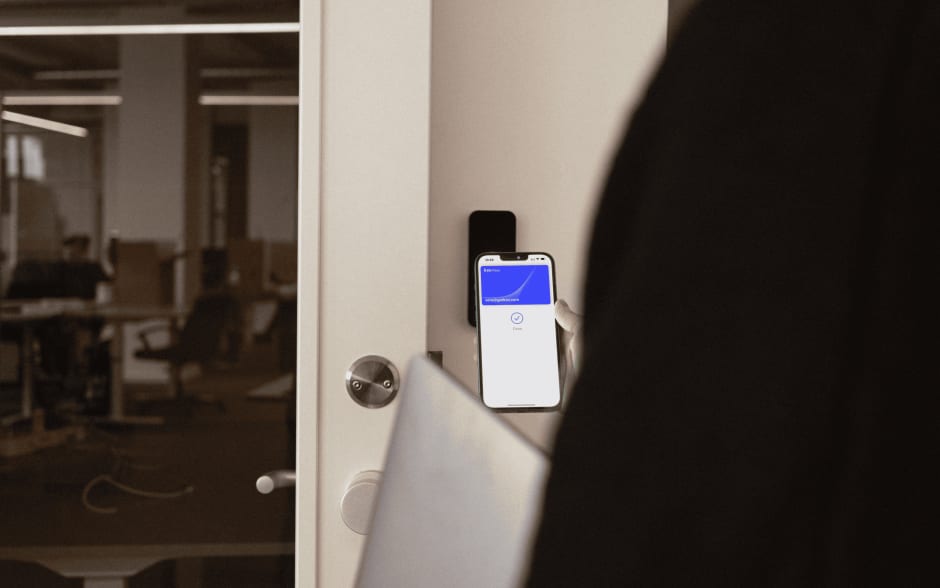
Security systems can be simple or complex based on the specific needs of your business. When you look for a system that aligns with your circumstances, keep these factors in mind:
- Priorities: Think about the greatest pain points to your business and how a security system can address them. For instance, if property theft is common in your area, a system with intrusion alerts is especially important. If you're trying to implement hybrid workplace policy, a modern-cloud based access system can increase convenience and streamline operations.
- Scaling: Outdated on-premise security systems rarely support business growth or optimization. Modern systems, like Kisi, empower small businesses to swiftly migrate to the cloud for streamlined growth and operations. The customizable deployment options ensure you have a great base to scale as your business grows while staying on budget.
- Capabilities: If you already have a small business security system in place, you can expand or enhance it to better suit your needs. This might mean adding a video intercom to your existing access control system, updating your video surveillance cameras to models with higher resolution, or updating your access control system to support mobile access.
- Integrations: When you select separate security system components from different providers, it can be difficult to tie them together. Look for open systems like Kisi, which can integrate with other solutions to form a single, cohesive system with a more seamless experience.
The scope of your small business security system ultimately depends on what your organization wants to achieve. Whether you’re just starting out or building on your old system, Kisi serves as an ideal foundation. With remote access, flexible access methods, and versatile deployment options, Kisi helps safely connect people and spaces. Solutions like the single door access control system kit make it an excellent choice even for very small business properties.
Strengthen your small business security with Kisi #
Strong security and access control are key ingredients for the success and longevity of your small business. They protect your financial interests, ensure the safety of your employees, and reflect how seriously you take your role as a small business leader.
Kisi is a natural fit when it comes to security systems for small businesses because it’s a scalable, straightforward solution that can work for properties of every size. Reach out to learn more about how Kisi’s access control can bring together all the elements of small business security.





